新版仁爱版七年级英语下册ReviewofUnits7_8词句精讲精练
仁爱版七年级英语下册ReviewofUnits7_8词句精讲精练含答案
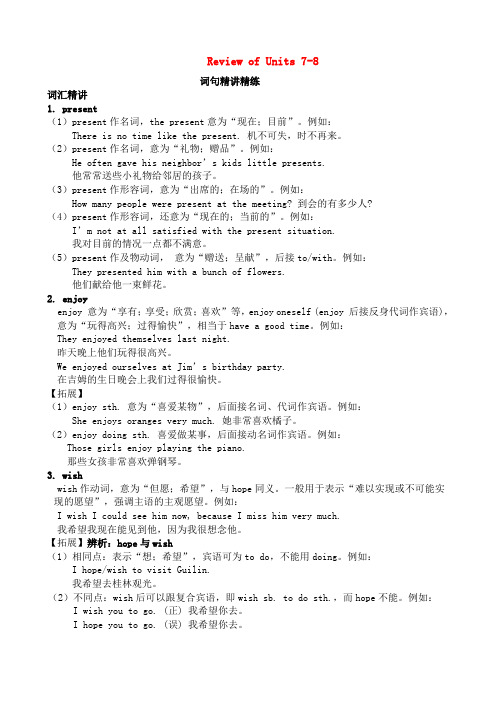
Review of Units 7-8词句精讲精练词汇精讲1. present(1)present作名词,the present意为“现在;目前”。
例如:There is no time like the present. 机不可失,时不再来。
(2)present作名词,意为“礼物;赠品”。
例如:He often gave his neighbor’s kids little presents.他常常送些小礼物给邻居的孩子。
(3)present作形容词,意为“出席的;在场的”。
例如:How many people were present at the meeting? 到会的有多少人?(4)present作形容词,还意为“现在的;当前的”。
例如:I’m not at all satisfied with the present situation.我对目前的情况一点都不满意。
(5)present作及物动词,意为“赠送;呈献”,后接to/with。
例如:They presented him with a bunch of flowers.他们献给他一束鲜花。
2. enjoyenjoy 意为“享有;享受;欣赏;喜欢”等,enjoy oneself (enjoy 后接反身代词作宾语),意为“玩得高兴;过得愉快”,相当于have a good time。
例如:They enjoyed themselves last night.昨天晚上他们玩得很高兴。
We enjoyed ourselves at Jim’s birthday party.在吉姆的生日晚会上我们过得很愉快。
【拓展】(1)enjoy sth. 意为“喜爱某物”,后面接名词、代词作宾语。
例如:She enjoys oranges very much. 她非常喜欢橘子。
(2)enjoy doing sth. 喜爱做某事,后面接动名词作宾语。
Review of Units 1-4词句精讲精练
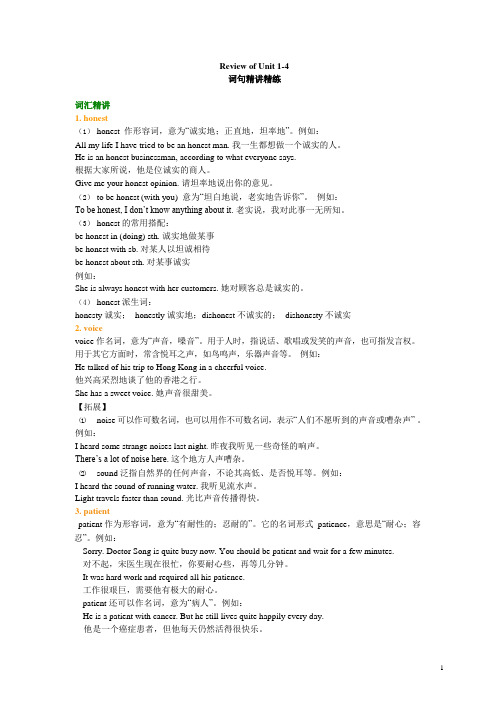
Review of Unit 1-4词句精讲精练词汇精讲1.honest(1)honest 作形容词,意为“诚实地;正直地,坦率地”。
例如:All my life I have tried to be an honest man. 我一生都想做一个诚实的人。
He is an honest businessman, according to what everyone says.根据大家所说,他是位诚实的商人。
Give me your honest opinion. 请坦率地说出你的意见。
(2)to be honest (with you)意为“坦白地说,老实地告诉你”。
例如:To be honest, I don’t know anything about it. 老实说,我对此事一无所知。
(3)honest 的常用搭配:be honest in (doing) sth. 诚实地做某事be honest with sb. 对某人以坦诚相待be honest about sth. 对某事诚实例如:She is always honest with her customers. 她对顾客总是诚实的。
(4)honest 派生词:honesty 诚实;honestly 诚实地;dishonest 不诚实的;dishonesty 不诚实2.voicevoice 作名词,意为“声音,嗓音”。
用于人时,指说话、歌唱或发笑的声音,也可指发言权。
用于其它方面时,常含悦耳之声,如鸟鸣声,乐器声音等。
例如:He talked of his trip to Hong Kong in a cheerful voice.他兴高采烈地谈了他的香港之行。
She has a sweet voice. 她声音很甜美。
【拓展】(1)noise 可以作可数名词,也可以用作不可数名词,表示“人们不愿听到的声音或嘈杂声” 。
例如:I heard some strange noises last night. 昨夜我听见一些奇怪的响声。
(完整版)仁爱七年级下Unit7知识点总结.doc

Unit 7Topic11.Happy Birthday! 生日快!2.take photos 拍照3.work out 作出,解决4.how about/what about 如何,怎5.fly kites 放筝6.row a boat 划船7.perform ballet ] 表演芭蕾舞8.dance the disco 跳迪斯科9.make model planes 做机模型10.draw pictures 画画11.show sb. sth.某人看某物12.two years ago 两年前13.be in hospital (生病)住院二、句型 :1.What are you going to perform at Kangkang’ s birthday你打party?算在康康的生日晚会上表演什么?“be going to+ 原形”的句型常用来表示打算、准做某事或即将生或肯定要生某事, be 是助,有人称和数的化,如:He is going to have a swim this afternoon.2.What about /How about + 名、代或名,意“⋯⋯怎么?”常用来表示⋯⋯的看法,或表示建、的方式,如:How/What about sitting here to look at the moon? 坐在儿月怎么?3.I only can sing English songs. 我只会唱英文歌曲。
(情can 的用法)They couldn’ t sing any English songs two years ago两年.前他不会唱英文歌曲。
一段 +ago:表示在⋯⋯以前,如:three months ago 三个月以前4.What will you buy for Kangkang as a birthday present?你要康康什么礼物?“will+ 原形”表将来。
仁爱版七年级下册Unit7--8重点词组默写版(有答案)

仁爱版七年级英语下册Unit7重点词组默写版(有答案)Unit 7 Topic 11、谈论2、课后3、一位忠实粉丝4、当然5、看6、想做某事7、一个生日聚会8、飞机模型9、足球10、看一下11、做一顿大餐12、做一个蛋糕13、买一些花14、计划做某事15、你什么时候出生?16、康康什么时候出生?17、他出生在哪里18、今天是几号?19、你的礼物是什么形状的?20、我们用它做什么?Unit 7 topic 21、玩得高兴2、在…岁时3、再也(不),(不)再4、别的东西5、弹钢琴6、表演芭蕾舞7、唱中文歌8、照相9、说日语10、开车11、唱生日快乐歌12、打乒乓球13、一年前14、去年15、在过去16、在她妈妈的帮助下17、一位伟大的作家18、一个好厨师19、把这些花带到聚会上20、你太棒了Unit 7 topic 31、中国功夫2、生日派对3、表演一些魔术4、立刻,马上5、摔倒6、昨天晚上7、十点半8、下一次9、回来10、吹灭11、许多12、制作卡片13、亲手14、许愿15、给某人带来某物16、伤着某人自己17、没坐到椅子18、怎么啦!19、请这边走20、下次不要那么迟/晚仁爱版七年级英语下册Unit7重点词组默写版(答案)Unit 7 Topic 11、谈论talk about2、课后after class3、一位忠实粉丝 a big fan4、当然of course5、看look at6、想做某事want to do sth7、一个生日聚会 a birthday party8、飞机模型model plane9、足球soccer ball10、看一下have a look11、做一顿大餐cook a big dinner12、做一个蛋糕make a cake13、买一些花bug some flowers14、计划做某事plan to do sth15、你什么时候出生?when were you born?16、康康什么时候出生?when was KangKang born?17、他出生在哪里where was he born?18、今天是几号? what was the date today?19、你的礼物是什么形状的?What’s the shape of your present?20、我们用它做什么?what do we use it for?Unit 7 topic 21、玩得高兴have a good time2、在…岁时at the age of3、再也(不),(不)再not…any more4、别的东西anything else5、弹钢琴play the piano6、表演芭蕾舞perform ballet7、唱中文歌sing Chinese songs8、照相take photos9、说日语speak Japanese10、开车drive a car11、唱生日快乐歌sing the song happy birthday12、打乒乓球play ping—pong13、一年前one year ago14、去年last year15、在过去in the past16、在她妈妈的帮助下with her mother’s help17、一位伟大的作家 a great writer18、一个好厨师 a good cook19、把这些花带到聚会上take these flowers to the party20、你太棒了You are so smart!Unit 7 topic 31、中国功夫Chinese kung fu2、生日派对birthday party3、表演一些魔术 perform some magic tricks4、立刻,马上at once5、摔倒fall down6、昨天晚上last night7、十点半half past ten8、下一次next time9、回来come back10、吹灭blow out11、许多lots of12、制作卡片make cards13、亲手by hand14、许愿make a wish15、给某人带来某物bring sth for sb16、伤着某人自己hurt oneself17、没坐到椅子miss the chair18、怎么啦!What’s the matter?19、请这边走This way please20、下次不要那么迟/晚Don’t be so late next time仁爱版七年级英语下册Unit8重点词组默写版Unit 8 topic 11、在春天2、去游泳3、爬山4、堆雪人5、去年6、穿上你的雨衣7、去外面8、最低温度9、最高温度10、大雨11、小雨12、后来13、复苏、复活14、开花、出版15、大多数地区16、变暖和17、戴太阳镜18、变绿19、一个美好季节20、收获的季节Unit 8 topic 21、暑假2、周游3、相聚4、名胜5、去度假6、春城7、一年到头8、一副太阳镜9、等等10、去旅行11、准备12、保证你的安全13、分享快乐14、要小心15、危险的地方16、待在太阳下17、独自游泳18、假期旅行19、始终和你朋友在一起20、远离Unit 8 topic 3 1、春节2、舞龙舞狮3、互相赠送礼物4、吃大餐5、母亲节6、父亲节7、中秋节8、最重要的节日9、忙于做某事10、彩灯11、在圣诞节前夕12、挂起13、去教堂做礼拜14、圣诞快乐15、不睡觉熬夜16、在午夜17、一天的假期18、压岁钱19、互相问候20、龙舟赛仁爱版七年级英语下册Unit8重点词组默写版(答案)Unit 8 topic 11、在春天in spring2、去游泳go swimming3、爬山climb hills4、堆雪人make snowmen5、去年last year6、穿上你的雨衣 put on your raincoat7、去外面go outside8、最低温度the lowest temperature9、最高温度the highest temperature10、大雨heavy rain11、小雨light rain12、后来later on13、复苏、复活come back to life14、开花、出版come out15、大多数地区most areas16、变暖和get warm17、戴太阳镜wear sunglasses18、变绿turn green19、一个美好季节 a wonderful season20、收获的季节the harvest seasonUnit 8 topic 21、暑假summer holiday2、周游travel around3、相聚get together4、名胜places of interest5、去度假go for a holiday6、春城the spring city7、一年到头all the year round8、一副太阳镜 a pair of sunglasses9、等等and so on10、去旅行take a trip11、准备prepare for12、保证你的安全keep you safe13、分享快乐share the fun14、要小心be careful15、危险的地方dangerous places16、待在太阳下stay in the sun17、独自游泳swim alone18、假期旅行holiday trip19、始终和你朋友在一起keep together20、远离keep away fromUnit 8 topic 31、春节Spring festival2、舞龙舞狮lion and dragon dances3、互相赠送礼物 give each other presents4、吃大餐 a big dinner5、母亲节Mother’s Day6、父亲节Father’s Day7、中秋节the Mid-autumn Festival8、最重要的节日 the most important festival9、忙于做某事be busy doing sth10、彩灯colorful lights11、在圣诞节前夕o n Christmas Eve12、挂起put up13、去教堂做礼拜go to church14、圣诞快乐Merry Christmas15、不睡觉熬夜stay up16、在午夜at midnight17、一天的假期 a one-day holiday18、压岁钱lucky money19、互相问候greet each other20、龙舟赛dragon boat races。
七年级英语下册ReviewofUnits7_8综合能力演练新版仁爱版

Review of Units 7-8综合能力演练I. 单项选择。
(15分,每题1分)1. —You look unhappy, John.? —Well, I found my mother looking through my mobile phone yesterday.A. You want to restB. What’s wrongC. How do you do2. Kangkang likes playing guitar, but Jane likes to play basketball.A. the; theB. the; /C. /; theD. /; /3. ——It’s June 1st.A. What’s the time now?B. What’s the date today?C. What day is it today?D. When were you born?4. Lin Tao is years old and tomorrow is his birthday.A. fourteen; fourteenB. fourteenth; fourteenthC. fourteen; fourteenthD. fourteenth; fourteen5. —Merry Christmas!—A. Thank you.B. Me, too.C. No problem.D. The same to you.6. You look tired. You should to bed earlier.A. to goB. goC. wentD. goes7. He would likein China.A. to stayB. stayingC. staysD. stay8. We planthe Great Wall.A. visitB. to visitC. visitingD. visited9. It is a good time .A. singB. sangC. singingD. to sing10. Look! There are some birds _______ in the sky. They are very beautiful.A. to flyB. flyC. flyingD. flown11. This term will be over. The students are busy for the test.A. preparingB. prepareC. to prepareD. prepared12. The flowers smell .A. wellB. badlyC. goodD. much well13. Maori people in New Zealand touch _______ when they meet.A.trees B.noses C.caps D.desks14. —I bought a very beautiful postcard for Teachers’ Day.—Great! When _____ you _____ it?A. do; buyB. will; buyC. did; buyD. did; bought15. Let’s ______ this festival.A. celebrateB. celebratingC. celebratesD. to celebrate II. 完形填空。
仁爱英语七年级下册Unit7-unit8总复习

仁爱英语七年级下册Unit7-unit8总复习仁爱七年级下学期期末课本内容总复习Unit7 --T opic 1 When is your birthday?1. May (the) thirteenth 五月十三日2. Next Thursday下个星期四;Next year 明年;Next week 下一周3. How do you plan to celebrate it? 你打算怎么庆祝?4. plan to do sth 打算/准备做某事5. Would you like to come? 你想参加吗?--Yes, I’d lov e to. 我非常乐意去6. When were you born? 你什么时候出生的?--I was born in 1998.我生于1998年。
7. Where was he born? 他在什么地方出生?--He was born in Huilai.他在惠来出生.8. What day is it today? 今天是星期几?--It’s Monday. 星期一What’s the date today?今天是几号?--It’s May 1s t. 5月1号9. in 用于表示周、月、季节、年,泛指上午、下午、晚上;10. on 用于星期,某日,某一天的上午、下午(具体某一天时,常用on)I was born on May 22nd,1967 . 出生于1967年5月22日。
11. Nineteen seventy-six 1976年; Two thousand and two 2002年12. What’s the shape of your present?= What shape is your present?你的礼物是什么形状的?-- It’s round.它是圆的13. Have a look看一看Have a rest 休息一会儿Have a swim 游泳Have a walk 散步14. just now 刚才=a moment ago 刚才15. How wide[waid] 多宽How long 多长How far 多远How often 多久一次(频率)16. use…for…用…做…--What do we use it for?我们用它做什么呢?--We use it to studyEnglish. 我们用它用来学习英语17. Must be 一定是Topic 2 Can you sing an English song?18.I’d like to play the piano 我想弹钢琴19. Sing with me 和我一起唱★Dance the disco跳迪斯科舞★P erform ballet 跳芭蕾舞20. ★Ride a bike 骑自行车★Drive a car 开车★Fly a kite 放风筝★play the guitar 弹吉他★Play basketball 打篮球★Play soccer 踢足球21. No way! 没门22. You are so smart! 你太棒了!23. Take…to …把…送/带到…Take these flowers to the party 把这些花带到聚会上去24. Could only dance a little 只会跳一点点儿舞25. Be good at doing sth 擅长/在…方面做得好Michael is good at playing soccer.Do well in sth/doing sth 擅长/在…方面做得好Michael does well in playing soccer.麦克擅长踢足球26. have a good time =have a great time = have a nice time=have a wonderful time=enjoy oneself 玩得开心,过得愉快27. When I was five=at the age of five 当我五岁时28. There was something wrong with her eyes. 她的眼睛有问题29. Couldn’t see anything= could see nothing 看不见任何东西30. Life was hard to her 生活对她来说变得很艰辛31. With her mother’s help在她妈妈的帮助下32. ago 之前two days 两天之前one year ago 一年前two month 两个月前Topic 3 We had a wonderful party33. How was Kangkang’s birthday party? 康康的生日聚会怎么样?34. Recite a Chinese poem 朗读汉语诗了吗?Perform magic tricks 表演魔术Perform kung fu 表演功夫35. It’s your turn 现在轮到你了36. What’s the matter? = What’s wrong?=What’s up? 怎么啦?37. Fell down 摔倒了38. hurt oneself 伤着某人自己39. Go to the movies = see a movie 到电影院去,去看电影40. Lie to sb = tell a lie to sb 对某人撒谎41. Tell me the truth 跟我说实话42. Each of us 我们每个人43. Make a wish 许愿44. Blow the candles out = blow out the candles 吹灭蜡烛45. Best wishes 最美好的祝愿Unit8--Topic 1What’s the weather like in spring?46. What’s the weather like in spring? 春天的天气怎么样?=How is the weather in spring?47. It is warm/ cool/ cold/ hot. 天气很暖和/凉爽/寒冷/热。
仁爱七年级下Review-of-unit-8-topic-1
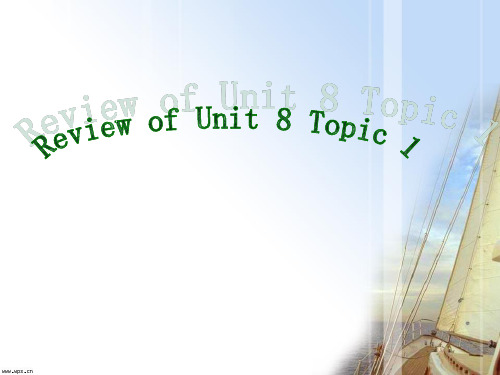
1. Please close the windows at once. (改为同义句) Please close the windows __r_ig_h_t_ __n_o_w__.
2. Things are going very well.(对画线部分提问)
eight degrees centigrade/ Celsius below zero 2℃读作 two degrees centigrade/Celsius
在英语中, 有些表示位置移动的动词的现在进行时可以表示将来, 如 go, come, leave,stay等。
The summer holiday_a_r_e_c_o_m__in__g. If you _p_la_n__t_o travel on your holidays. You h__a_d_b_e_t_te_r know about the weather in different places in August.
remember to do sth. forget to do sth. put on the raincoat remember doing sth.
forget doing sth.
nice and bright
temperature
low
high, the lowest/highest temperature
I_n_m__o_s_t_a_r_e_a_s_o_f_ China, it is very hot. The sun _s_h_in_e_s_ brightly. You need to_w_e_a_r__s_u_n_g_la_s_s_e_s, a T-shirt and shorts. Sometimes it rains suddenly, but _l_a_te_r_o__n, it may _g_e_t_f_in_e__ again.
仁爱英语七年级下册语法精讲7和8单元
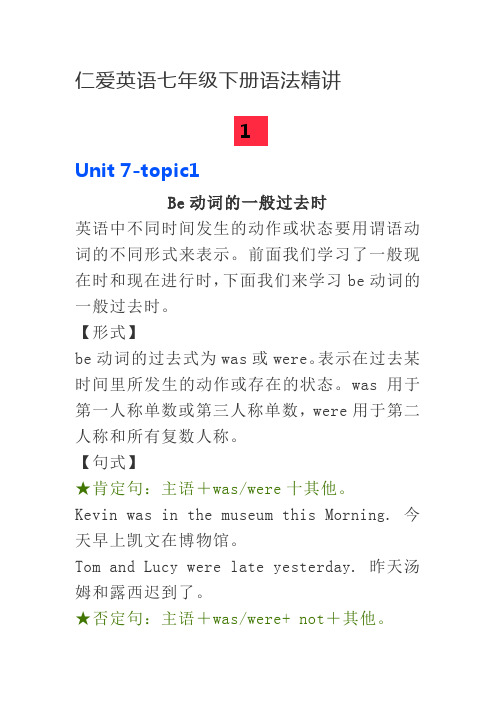
仁爱英语七年级下册语法精讲1Unit 7-topic1Be动词的一般过去时英语中不同时间发生的动作或状态要用谓语动词的不同形式来表示。
前面我们学习了一般现在时和现在进行时,下面我们来学习be动词的一般过去时。
【形式】be动词的过去式为was或were。
表示在过去某时间里所发生的动作或存在的状态。
was用于第一人称单数或第三人称单数,were用于第二人称和所有复数人称。
【句式】★肯定句:主语+was/were十其他。
Kevin was in the museum this Morning. 今天早上凯文在博物馆。
Tom and Lucy were late yesterday. 昨天汤姆和露西迟到了。
★否定句:主语+was/were+ not+其他。
They weren't athome yesterday. 他们昨天没在家。
Nancy was not late for school last Tuesday. 上周二南希上学没迟到。
★一般疑问句:Was/ Were十主语十其他?肯定回答:Yes, 主语+was/were.否定回答:No, 主语+wasn't/weren't.—Were your parents angry with you lastnight?昨晚你的父母生你气了吗?—Yes, they were.是的,他们生气了。
/ No, they weren't. 不,他们没有。
★特殊疑问句:特殊疑问词+was/were+主语+其他?How was your summer camp? 你的夏令营怎么样?Where were your new books?你的新书在哪里?基数词和序数词1. 基数词的奥妙表示数目多少的数词叫基数词。
它的构成方式是这样的:(1)1-12 为独立的单词,有其各自的形式。
如:(2)13-19都以teen 结尾,单词中的两个音节都读重音。
七年级英语下册 Unit 7 The Birthday Party句式精讲精练 (新版)仁爱版
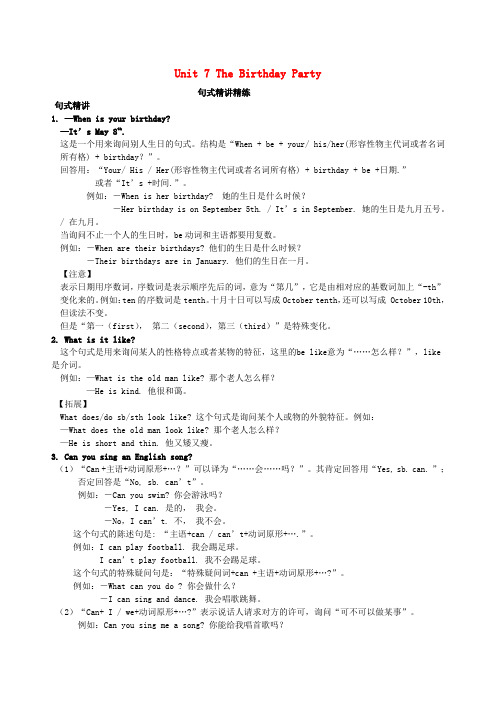
Unit 7 The Birthday Party句式精讲精练句式精讲1. —When is your birthday?—It’s May 8th.这是一个用来询问别人生日的句式。
结构是“When + be + your/ his/her(形容性物主代词或者名词所有格) + birthday?”。
回答用:“Your/ His / Her(形容性物主代词或者名词所有格) + birthday + be +日期.”或者“It’s +时间.”。
例如:-When is her birthday? 她的生日是什么时候?-Her birthday is on September 5th. / It’s in September. 她的生日是九月五号。
/ 在九月。
当询问不止一个人的生日时,be动词和主语都要用复数。
例如:-When are their birthdays? 他们的生日是什么时候?-Their birthdays are in January. 他们的生日在一月。
【注意】表示日期用序数词,序数词是表示顺序先后的词,意为“第几”,它是由相对应的基数词加上“-th”变化来的。
例如:ten的序数词是tenth。
十月十日可以写成October tenth,还可以写成 October 10th,但读法不变。
但是“第一(first),第二(second),第三(third)”是特殊变化。
2. What is it like?这个句式是用来询问某人的性格特点或者某物的特征,这里的be like意为“……怎么样?”,like 是介词。
例如:—What is the old man like? 那个老人怎么样?—He is kind. 他很和蔼。
【拓展】What does/do sb/sth look like? 这个句式是询问某个人或物的外貌特征。
例如:—What does the old man look like? 那个老人怎么样?—He is short and thin. 他又矮又瘦。
(完整版)仁爱英语七年级下册unit7topic1短语句子听写

Unit7 topic11.默写1----12月份单词。
_____________________________________ _____________________________________ _____________________________________ _____________________________________ 2.写出下列数字的序数词。
one--- two-- three--- four--- five--- six-- seven--- eight--- nine--- ten--- twelve--- twenty--- thirty---forty---fifty---sixty--- seventy--- eighty--- ninety---one hundred---one hundred and one---3.和某人谈论某事____________________4.某人的超级粉丝_________________5.计划做某事___________________6.为某人举办生日晚会_________________7.看一看___ ___ _____8.出生___ ____句子:1.他什么时候出生的?__________________ ---他出生于1999年12月5号。
________________________2.你在哪里出生的?___________________ ---我出生在London。
____________________3.你的生日是什么时候?---十月一号。
_______________________ --- __________4.今天几号?---一月一号。
___________________---___________5.你打算怎么庆祝你的生日?(plan, celebrate) __________________________6.你的礼物是什么形状?________________7.它像什么?---它像一朵花。
七年级英语下册ReviewofUnits7_8词句精讲精练新版仁爱版
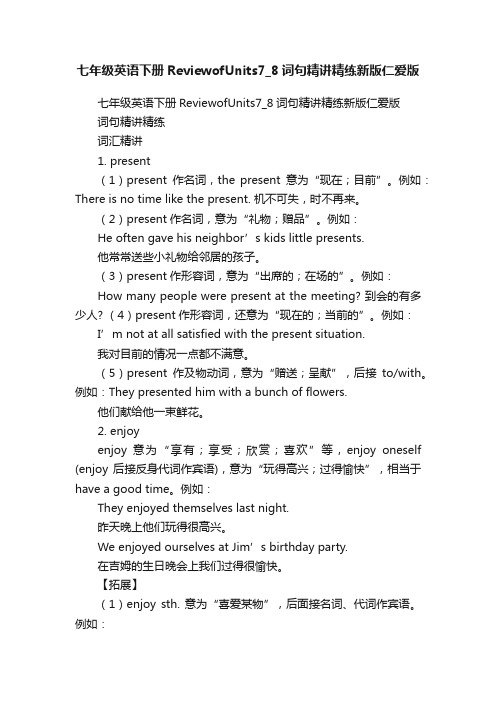
七年级英语下册ReviewofUnits7_8词句精讲精练新版仁爱版七年级英语下册ReviewofUnits7_8词句精讲精练新版仁爱版词句精讲精练词汇精讲1. present(1)present作名词,the present意为“现在;目前”。
例如:There is no time like the present. 机不可失,时不再来。
(2)present作名词,意为“礼物;赠品”。
例如:He often gave his neighbor’s kids little presents.他常常送些小礼物给邻居的孩子。
(3)present作形容词,意为“出席的;在场的”。
例如:How many people were present at the meeting? 到会的有多少人? (4)present作形容词,还意为“现在的;当前的”。
例如:I’m not at all satisfied with the present situa tion.我对目前的情况一点都不满意。
(5)present作及物动词,意为“赠送;呈献”,后接to/with。
例如:They presented him with a bunch of flowers.他们献给他一束鲜花。
2. enjoyenjoy 意为“享有;享受;欣赏;喜欢”等,enjoy oneself (enjoy 后接反身代词作宾语),意为“玩得高兴;过得愉快”,相当于have a good time。
例如:They enjoyed themselves last night.昨天晚上他们玩得很高兴。
We enjoyed ourselves at Jim’s birthday party.在吉姆的生日晚会上我们过得很愉快。
【拓展】(1)enjoy sth. 意为“喜爱某物”,后面接名词、代词作宾语。
例如:She enjoys oranges very much. 她非常喜欢橘子。
仁爱版英语七年级下册Unit7重点短语句型归纳

仁爱版英语七年级下册Unit 7 The Birthday PartyTopic 1 When is your birthday?Section A一. 重点词语be born出生二:重点句型1.When was she born? 她在什么时候出生?She was born in July, 1965. 她在1965年7月出生。
2.Where was she born? 他在哪里出生?In Wales, the UK. 他出生在英国,威尔士。
询问出生日期与地点句子:When/Where + was/were + 主语+ born?主语+ was/were + born + in/on…三:重点语法时间介词in/on/at用法介词in/on/at可以用于表示时间的名词前,有“在”的意思,用法如下:1)at用于钟点时刻前,意思为“在--- 时(刻)”,如at three O’clockat a quarter to six at noon at night at midnight2)in 用于泛指一天的上午,下午,晚上等,也用于某个较长的时间,如年,月,季节等,如in the morning/afternoon/evening in 2003, in the day/daytime.in还可以表示“从现在起一段时间以后”in a week3)on用于表示在具体的某一天以及某天的某段时间,如on Sundayon Children’s day , on the night of new year,on the morning\afternoon\ e vening of …, on Sunday morningSection B一. 重点词语1. 序数词:①one — first two — second three — third(特殊1.2.3)②five — fifth twelve — twelfth(以ve结尾的)③eight — eighth nine — ninth (8去t,9去e)④twenty—twentieth thirty—thirtieth ninety—ninetieth(以ty结尾)⑤four—fourth fifteen—fifteenth one hundred—one hundredth(一般情况)2. plan/want to do sth:计划/想要做某事二:重点句型1.When is your birthday? 你的生日是什么时候?= When were you born?2.What’s the date today? 今天几号?三:重点语法序数词变化规则1) 序数词1━19 除第一,第二,第三,第五,第八,第九, 第十二变化不规则外, 其余均由在基数词后加上-th。
仁爱版英语七年级下册 Unit 7【单元知识梳理】

When _w_e_r_e_ you born? I _w_a_s__ born in January,1999.
When was Kangkang born? He _w__a_s_ born on May 13th, 2005.
Where _w_a_s_ he born? He was born in China.
2a. Work out the rules of forming ordinal numbers and fill in the blanks. Then listen, check and repeat.
1 one
first
1st
2 two
second
2nd
3 three third
3rd
4 four
You are so smart! I'd like to take these flowers to the party.
Summary
1.一般过去时的概念 一般过去时表示过去某个时间发生的动作或存
在的状态,常和表示过去的时间状语连用, 如:last year, yesterday等; 也可表示过去经常反复发生 的动作,常和often, always等频度副词连用。 Example:①I saw him in the street yesterday.
-Yes, we did. (No, we didn’t.) 特殊疑问句:疑问词+did + 主语+动词原形+其他? Example: What did you do last night?
Summary
一般过去时口诀
一般过去时并不难,表示过去动作、状态记心间。 动词要用过去式,时间状语句末站。 否定句很简单,didn’t 站在动词原形前,其他部分 不要变。 一般疑问句也好变,did放在句子前,主语、动词 原形、其他部分依次站。 特殊疑问句也简单,疑问词加一般疑问句记心间。
仁爱版2024年中考英语第一轮课本复习:七年级下册Units7—8

返回首页
1.—What’s the matter with you,Mr.Smith?
—I’ve got a terrible pain in my back.
2.—Mike,you don’t look well. What’s wrong/What’s the matter (with
2024年中考复习专题
七年级下册 Units 7—8
1
目
录2
回归教材 知识梳理 综合训练
1
回归教材 知识梳理
返回首页
知识点1 enjoy的用法
Did Kangkang enjoy himself?康康玩得开心吗?(Unit 7 P71) enjoy意为“享受;喜爱”,是及物动词,相当于like ...very much或 be interested in ...。主要用法如下:
返回首页
知识点2
What’s the matter?句型
—What’s the matter?怎么啦?/有什么问题?
—I missed the chair and fell down.我没坐到椅子上,摔倒了。
“What’s the matter (with sb./sth.)?”意为“(某人/某物)怎么
了?”,常用来询问身体有什么不适或有什么不顺心的事,也可以用来
询问某物出了什么故障。回答身体不适时常用“have+a(n)+表示疾
病或病痛的名词”或“have a sore+身体部位名词”。如:
—What’s the matter with the boy?这个男孩怎么了?
—He has a cold.他感冒了。/He has a sore throat.他喉咙痛。
- 1、下载文档前请自行甄别文档内容的完整性,平台不提供额外的编辑、内容补充、找答案等附加服务。
- 2、"仅部分预览"的文档,不可在线预览部分如存在完整性等问题,可反馈申请退款(可完整预览的文档不适用该条件!)。
- 3、如文档侵犯您的权益,请联系客服反馈,我们会尽快为您处理(人工客服工作时间:9:00-18:30)。
Review of Units 7-8词句精讲精练词汇精讲1. present(1)present作名词,the present意为“现在;目前”。
例如:There is no time like the present. 机不可失,时不再来。
(2)present作名词,意为“礼物;赠品”。
例如:He often gave his neighbor’s kids little presents.他常常送些小礼物给邻居的孩子。
(3)present作形容词,意为“出席的;在场的”。
例如:How many people were present at the meeting? 到会的有多少人?(4)present作形容词,还意为“现在的;当前的”。
例如:I’m not at all satisfied with the present situation.我对目前的情况一点都不满意。
(5)present作及物动词,意为“赠送;呈献”,后接to/with。
例如:They presented him with a bunch of flowers.他们献给他一束鲜花。
2. enjoyenjoy 意为“享有;享受;欣赏;喜欢”等,enjoy oneself (enjoy 后接反身代词作宾语),意为“玩得高兴;过得愉快”,相当于have a good time。
例如:They enjoyed themselves last night.昨天晚上他们玩得很高兴。
We enjoyed ourselves at Jim’s birthday party.在吉姆的生日晚会上我们过得很愉快。
【拓展】(1)enjoy sth. 意为“喜爱某物”,后面接名词、代词作宾语。
例如:She enjoys oranges very much. 她非常喜欢橘子。
(2)enjoy doing sth. 喜爱做某事,后面接动名词作宾语。
例如:Those girls enjoy playing the piano.那些女孩非常喜欢弹钢琴。
3. wishwish作动词,意为“但愿;希望”,与hope同义。
一般用于表示“难以实现或不可能实现的愿望”,强调主语的主观愿望。
例如:I wish I could see him now, because I miss him very much.我希望我现在能见到他,因为我很想念他。
【拓展】辨析:hope与wish(1)相同点:表示“想;希望”,宾语可为to do,不能用doing。
例如:I hope/wish to visit Guilin.我希望去桂林观光。
(2)不同点:wish后可以跟复合宾语,即wish sb. to do sth.,而hope不能。
例如:I wish you to go. (正) 我希望你去。
I hope you to go. (误) 我希望你去。
(3)两者都可接that从句,但是“hope + that从句”表示希望,“wish + that从句”表示愿望,且从句的谓语动词要用虚拟语气。
例如:I hope you’ll be better soon.我希望你很快好起来。
I wish I were really wealthy.但愿我真的富有。
(4)wish后可接双宾语。
例如:We wish you a happy New Year!我们祝你新年快乐!4. forgetforget 动词,意为“忘记;遗忘”,作及物动词时意为“忘记”,其后可以直接跟名词作宾语,也可以跟动词不定式或者动名词;作不及物动词时意为“遗忘东西”。
它的反义词是 remember,形容词是forgetful。
例如:Let’s forget the bad past!让我们忘记糟糕的过去吧!I’ve forgotten about it.我已经忘记这件事了。
Don’t forget to bring me an umbrella.别忘了给我带把伞。
【拓展】forget 和 leave的区别(1)forget不与表示地点的介词短语连用,只是表示忘记,但不具体表明将某物忘在了什么地方。
例如:Once when we were going to Paris, I forgot my passport.有一次我们准备去巴黎时,我忘了带护照。
(2)leave 常与表示地点的介词短语连用,表示“将某物忘在某地”。
例如:I left my key in my office.我把钥匙落在办公室了。
5. wear / put onwear是及物动词,可用于穿衣、穿鞋、戴帽子、戴手套、佩戴首饰等,强调状态。
例如:I’m going to wear a pair of sunglasses tomorrow.明天我打算戴一副太阳镜。
She is wearing a hat.她戴着一顶帽子。
【拓展】(1)put on表示穿衣服的动作,其反义词是take off。
例如:He quickly put on his shoes and ran out.他迅速穿上鞋,跑了出去。
(2)have on 和in 都指穿的状态,但have on不用于进行时态;in是介词,可以和表示服装或颜色的名词一起构成介词短语作定语,也可以和be动词连用构成系表结构。
例如:He has a red T-shirt on. = He is in a red T-shirt.他穿一件红色的T恤衫。
The girl in pink is my little sister.穿粉色衣服的那个女孩是我的小妹妹。
6. had betterhad better(常简略为’d better)是一固定词组,had better意为“最好”,用于表示对别人的劝告、建议或表示一种愿望。
其用法有以下几点:(1)had better后面必须跟动词原形,构成had better do sth.句型,意为“最好做某事”。
【注意】这里的had不能用have来替换。
例如:You’d better go to hospital at once.你最好立即去医院看病。
Tom, you’d better go there today.汤姆,你最好今天去那里。
(2)主语不论是第几人称,句子不论是什么时态,都要用had better的形式。
例如:Now you (he/ we) had better listen to the teacher.你(他/我们)现在最好听老师讲。
(3)had better的否定形式为had better not,构成had better not do sth.句型,意为“最好不要做某事”。
例如:You had better not do that stupid thing.你最好不要做那样愚蠢的事。
7. come out(1)come out是动词词组,意为“出版”。
例如:When will his new novel come out?他新创作的小说什么时候出版?(2)come out意为“出现”。
例如:The moon came out from behind the clouds.月亮从云后露出脸来。
(3)come out意为“长出;开花”。
例如:The flowers come out. 花开了。
8. arrivearrive意为“到达”,是不及物动词,如果后面接地点副词,如:home, there, here等词,不需要再加介词。
后接地点名词时,应加介词in或at。
大地方用in,如country, city等;小地方用at,如school, hotel, stop等。
例如:They arrived in Beijing yesterday.他们昨天到达北京。
When you arrive home, please give me a call.到家的时候请给我打个电话。
【拓展】arrive;get to;reach的辨析:(1)get to 意为“到达……”。
其后接表示地点的副词(如here; there; home等)时,介词to要省略。
例如:T hey’ll get to Beijing at six tonight.他们将在今晚六点到达北京。
I’ll get there on time.我会按时到达那里。
(2)reach是及物动词,可以直接加宾语。
例如:I’ll call you as soon as I reach New York.我一到达纽约就给你打电话。
9. ago&before(1)ago表示“从现在起的若干时间以前”,意思是“距今……以前”,需和过去时或过去进行时连用。
before泛指“从过去起的若干时间以前”,意思是“距过去某时……以前”,常和完成时连用,尤其在间接引语中,例如:His parents died ten years ago.他父母十年前都去世了。
He said that his parents had died ten years before.他说他父母亲十年前都去世了。
I have never been there before.我以前从来没有去过那里。
(2)如果不具体表明多少时间以前,只用before不用ago,意为“从前、以前”。
before仍以副词的形式置于被修饰语后,常与完成时或者过去时连用。
例如:Have you seen this film before?你以前看过这部电影吗?He asked me whether I had been to the Great Wall before.他问我以前是否去过长城。
(3)表示在某一点时间或事件以前时,只用before不用ago,这种用法是将before当作介词或连词使用。
ago不具有这一功能。
例如:They will come back before six o’cloc k.他们将在6点前回来。
It is hoped that this will be finished before the year 1995.希望这件工作将在1995年以前完成。
10. busy(1)busy作形容词,意为“忙的;繁忙的”,在句中既作定语,又可作表语。
它的反义词是free。
例如:Mr. Li is a busy man. 李老师是一个忙人。
I’m very busy today. 今天我特别忙。
(2)busy 常用的句式如下:1)be busy with sth.意为“忙于某事”。
例如:My mother is busy with her work.我的妈妈忙于她的工作。
2)be busy doing sth. 意为“忙于做某事”。
